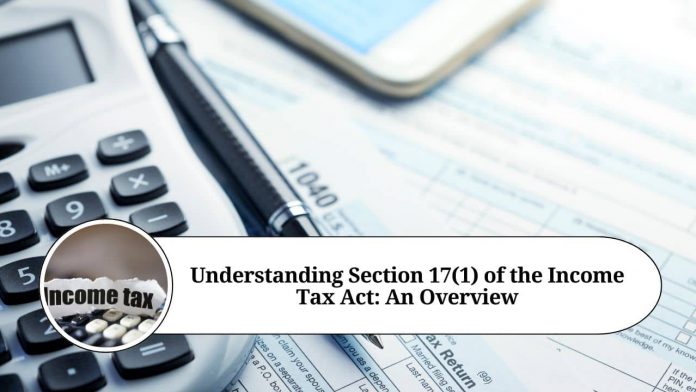The Income Tax Act is the primary legislation that governs the taxation of income in India. Section 17(1) of the Act is a significant provision that deals with the computation of income from salaries. This section outlines the various components of salary income that are taxable in India. In this article, we will discuss the provisions of section 17(1) of the Income Tax Act and its implications for taxpayers.
Understanding Section 17(1) of the Income Tax Act:
Section 17(1) of the Income Tax Act, 1961, defines the term ‘salary’ for taxation. It states that ‘salary’ includes all remuneration received by an employee from an employer in cash, kind, or as a monetary value of a perquisite. This definition is broad and covers all types of payments made by an employer to an employee.
The term ‘salary’ is an essential component of taxable income, and it is taxed under the head ‘income from salaries.’ The Income Tax Act provides detailed rules for the computation of income from salaries under sections 15 to 17.
Components of Salary Income under Section 17(1):
Section 17(1) outlines the various components of salary income that are taxable in India. These components include:
- Basic Salary: Basic salary is the fixed amount paid to an employee as per the terms of the employment contract.
- Dearness Allowance: Dearness allowance is the amount paid to an employee to compensate for the increased cost of living due to inflation.
- Bonus: A bonus is an additional payment made to an employee over and above their regular salary as a reward for their performance.
- Commission: Commission is the amount paid to an employee based on their sales performance.
- Perquisites: Perquisites are the additional benefits provided by an employer to an employee, such as a company car, house rent allowance, or medical allowance.
Exemptions under Section 17(1):
Section 17(1) also provides certain exemptions for certain types of income. These exemptions include:
- HRA: House Rent Allowance is exempt from tax up to a certain limit if it is a part of the salary package.
- LTA: Leave Travel Allowance is exempt from tax for two journeys made in a block of four years.
- EPF: Employer contribution to Employee Provident Fund is exempt up to a certain limit.
- Gratuity: Gratuity received by an employee on retirement or termination of employment is exempt up to a certain limit.
- Superannuation: Employer’s contribution to the superannuation fund is exempt up to a certain limit.
Implications for Taxpayers
Section 17(1) has significant implications for taxpayers, as it outlines the various components of salary income that are taxable in India. Employees need to understand the various components of salary income and the exemptions available under the Income Tax Act. This understanding will help taxpayers plan their tax liability effectively and maximize their tax savings.
Conclusion:
In conclusion, section 17(1) of the Income Tax Act is a crucial provision that outlines the various components of salary income that are taxable in India. This section provides a comprehensive definition of the term ‘salary’ and also outlines the exemptions available to taxpayers. Taxpayers need to understand the provisions of section 17(1) and its implications for tax planning purposes.
Read Other Useful Blogs:
Frequently Asked Questions:
Q: What is Section 17(1) of the Income Tax Act?
A: Section 17(1) of the Income Tax Act is a provision that deals with the taxable value of perquisites or benefits provided by an employer to an employee.
Q: What is a perquisite?
A: A prerequisite, also known as a perk or fringe benefit, is any benefit or amenity that is provided by an employer to an employee in addition to their regular salary or wages.
Q: What types of perquisites are covered under Section 17(1)?
A: Section 17(1) covers a wide range of perquisites, including rent-free accommodation, free or concessional use of a company car, club memberships, interest-free loans, free or subsidized meals, and more.
Q: How is the value of perquisites determined under Section 17(1)?
A: The value of perquisites is determined by the Income Tax Act or by the Income Tax Rules. In most cases, the value is based on the actual cost of the benefit to the employer, or a standard valuation method prescribed by the Income Tax Act or Rules.
Q: Is the value of perquisites taxable?
A: Yes, the value of perquisites is taxable as income under the Income Tax Act, and is subject to income tax in the hands of the employee.
Q: Who is responsible for paying the income tax on perquisites?
A: Generally, the employer is responsible for deducting and withholding the appropriate amount of tax from the employee’s salary or wages, including any tax on perquisites. However, the employee is ultimately responsible for paying the tax on their total income, including perquisites.
Q: Are there any exemptions or deductions available for perquisites?
A: Yes, there are certain exemptions and deductions available for perquisites under the Income Tax Act, such as exemptions for certain medical benefits or reimbursements, or deductions for certain expenses incurred in earning the prerequisite.
Q: What are the penalties for non-compliance with Section 17(1)?
A: Non-compliance with Section 17(1) can result in penalties and interest charges, as well as legal action by the tax authorities. Employers who fail to comply with the provider may also be subject to fines or other penalties under other laws or regulations.




















